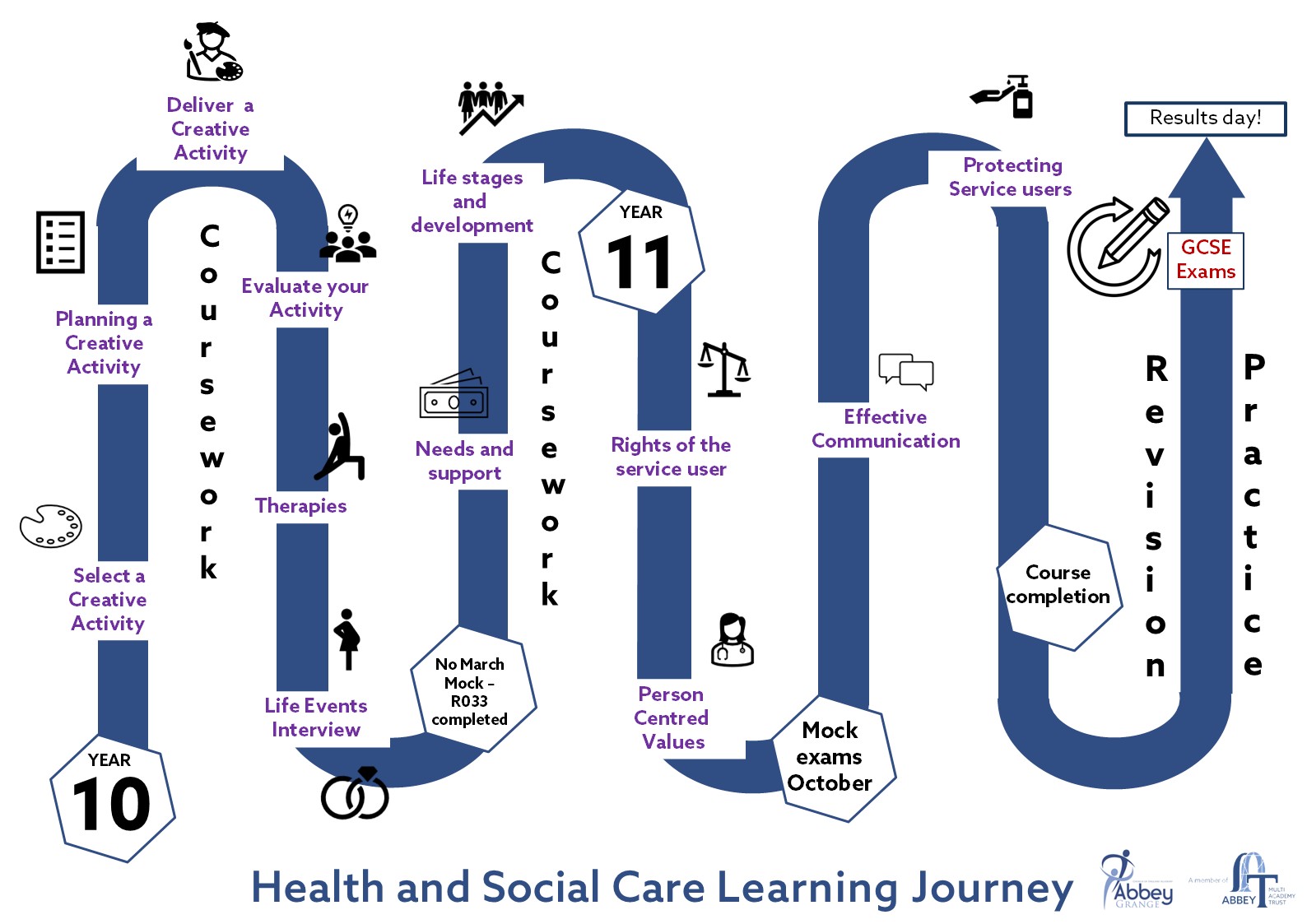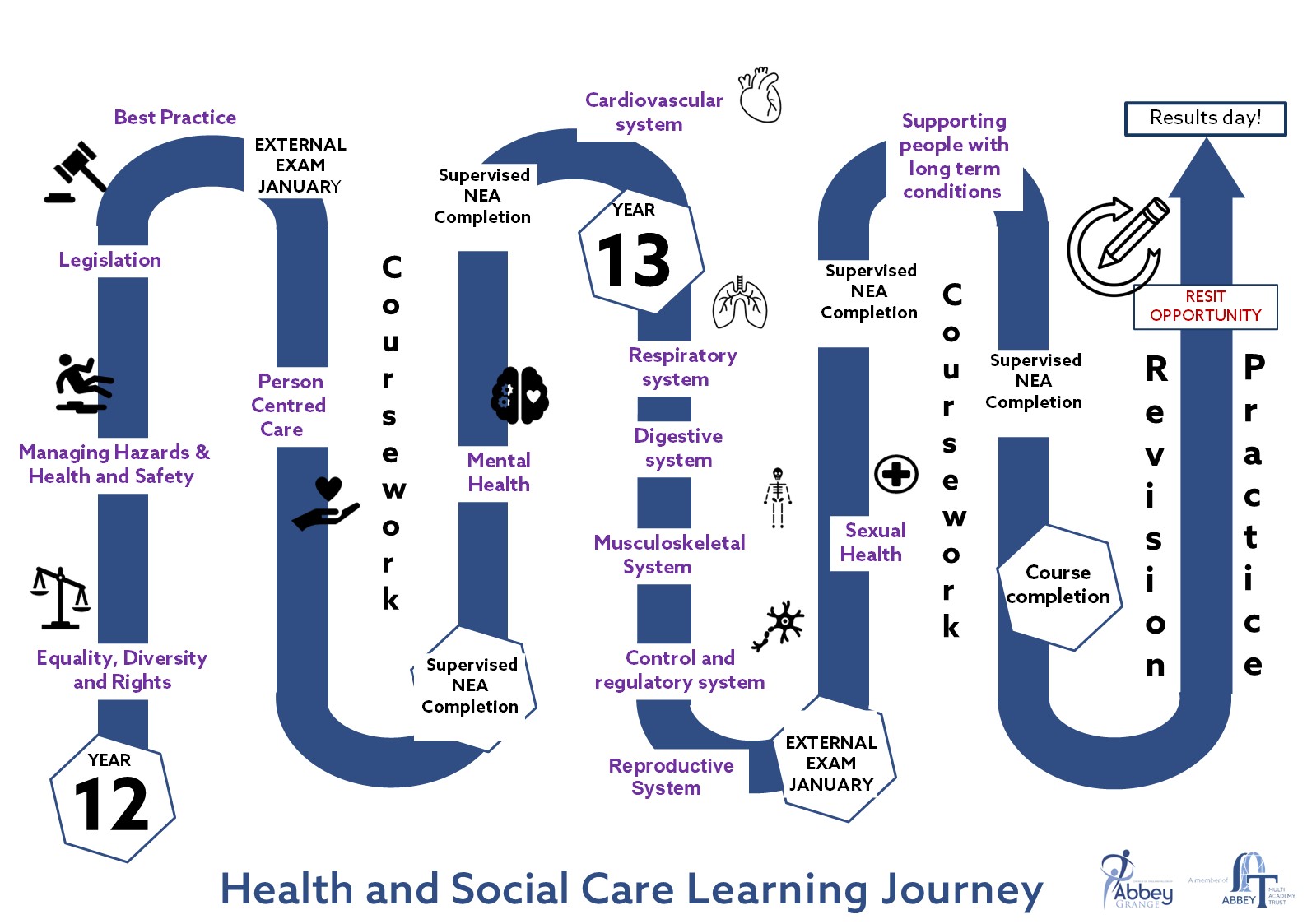
Benevolence is at the heart of health and social care. We strive to work together to support personal development through both practical experience and written work, helping learners build confidence and leadership skills. Our curriculum is rooted in the knowledge, compassion, and commitment essential for making a meaningful difference in future health and social care careers.

Students will develop a comprehensive understanding of the key principles that underpin the health and social care sector. Students will learn about the importance of respecting individuals' rights and how to ensure person-centred care in different settings. They will explore the fundamental principles of care and how these are applied in practice to support people effectively. Students will examine how individuals experience significant life events and the impact these have on their well-being and explore the role of creative and therapeutic activities. Through practical activities students will have the opportunity to develop their communications and active listening.
Students will strive for excellence in all aspects of learning and development as work will be continuously assessed throughout the course.
Students will demonstrate youth leadership through delivering creative activities, showing initiative and responsibility. They will need to apply benevolence when supporting others, especially during planned creative activities, ensuring that compassion and empathy to guide their actions.
Overcoming the fear of presenting a creative activity to their peers will strengthen their belief in themselves and boosted their confidence. They will aim to be a reflective practitioner, constantly evaluating my performance and seeking ways to improve in pursuit of excellence.
Benevolence plays a crucial role when discussing life events that may affect individuals, during the interview they undertake they will need sensitivity and understanding of the impact such experiences can have on individuals. Excellence is also reflected in the effort to find the most appropriate support tailored to an individual’s needs when the design a support plan.
When studying the essential principles in Health and Social Care students will explore how professionals in this field must honour the cultural, religious, and personal values and why maintaining high standards of care and striving for continuous improvement are key aspects of excellence. They will learn that strong leaders inspire those around them, uphold care standards, and advocate for the needs and rights of service users.
Students will have the opportunity for spiritual development by fostering empathy, self-awareness, and respect for others. Through learning about person-centred care, individual rights, and effective communication, students gain the tools to create safe, supportive environments where people feel valued and understood. Engaging with life events, therapeutic activities, and personal growth encourages reflection on meaning, purpose, and identity.
Students will be assessed through a combination of a written examination and non-exam assessments (NEA). The written exam at the end year 11 accounts for 40% of the overall grade and consists of a range of question types, including short-answer, medium-answer, and extended-response questions, ensuring that students can demonstrate their understanding in various ways.
The remaining 60% of the assessment is coursework-based. Students will undertake two non-exam assessments, each contributing 30% to the final grade. The first involves investigating and delivering creative activities, incorporating a practical assessment element. The second focuses on supporting individuals through life events, requiring independent research and structured coursework.
Students can choose to study health and social care at KS4 and then have the option to study AAQ (advanced national qualification) in health and social care which is the equivalent to 1 A level.

Students will begin by exploring the core principles of care, including safeguarding, legislation, and effective communication. They will develop a scientific understanding of the human body through the study of anatomy and physiology, examining how lifestyle choices and common conditions impact health. A strong emphasis is placed on person-centred care, where students learn to empower individuals and tailor support to their unique needs. Students will deepen their Mental health awareness through the study of various conditions and strategies for support, while the unit on sexual health, pregnancy, and postnatal care equips students to provide sensitive, informed support during key life stages. Students will develop key oracy skills such as clear verbal communication, active listening, empathetic interaction, and confident presentation. Through group discussions, role-plays, and reflective tasks, learners build the ability to express ideas clearly, collaborate effectively, and adapt their communication to different audiences—skills essential for success in health and social care settings.
Students are encouraged to aim high in both their academic and personal development. This course challenges them to set goals and continuously improve their knowledge and skills.
Benevolence is at the heart of health and social care. Students will learn to act with compassion, empathy, and kindness when supporting individuals with diverse needs. The Person-Centred Care unit and Supporting People with Mental Health Conditions it will emphasize the importance of understanding others’ experiences and acting in their best interests.
Students build confidence through practical tasks, presentations, and leadership opportunities. They are encouraged to believe in their ability to make a positive impact and overcome challenges to support service users.
Throughout the course students will learn that excellence is promoted through high standards of care, academic rigor, and continuous improvement. Students will explore the importance of upholding professional values, follow best practices, and strive for quality in everything they do.
Students will take on leadership roles through planning and delivering activities, working collaboratively, and advocating for others.
Students will explore their spiritual growth by promoting empathy, self-awareness, and respect for individual values. Students explore core principles of care such as safeguarding, legislation, and communication while developing a scientific understanding of health through anatomy and physiology. Emphasis on person-centred care and mental health awareness encourages reflection on identity, purpose, and emotional well-being. Units on sexual health and life stages deepen sensitivity and compassion. Through oracy development, group work, and reflective tasks, students build meaningful connections, express themselves confidently, and support others with understanding key elements of spiritual development in health and social care.
Students will be assessed through a combination of external examinations and internally assessed coursework, allowing students to demonstrate both theoretical understanding and practical application. Two units—F090 (Principles of Health and Social Care) and F091 (Anatomy and Physiology)—are externally assessed through written exams and together contribute 44% of the final grade. The remaining 56% is based on non-examined assessment (NEA), which includes F092 (Person-Centred Approach to Care), F093 (Supporting People with Mental Health Conditions), and further two optional NEA units.
Students are provided with a pathway into higher education, apprenticeships, and employment. For university progression, the course provides a strong base for degrees in nursing, midwifery, social work, occupational therapy, psychology, and public health. For apprenticeships, students are prepared for roles such as Healthcare Support Worker, Adult Care Worker, or Children and Families Practitioner. In terms of careers, the qualification provides access to entry-level roles such as a mental health support worker, with the potential to progress into specialist or leadership positions through further training.